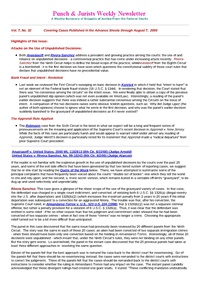Here the Sixth Circuit vacated a drug sentence based on the Supreme Court's ruling in Apprendi v. New Jersey, and while the facts were particularly harsh, the Court commented that Apprendi made a "radical departure" from prior precedent.
This decision arises out of one of those unusually harsh …
Here the Second Circuit again affirmed its rule that ineffective assistance of counsel is not a proper basis for a downward departure at sentencing, and instead held that the issue should properly be raised in a § 2255 motion.
The defendant in this case appealed to the Second …
In this case, a divided en banc court held that the provision of the Prison Litigation Reform Act which requires a showing of physical injury before a prisoner may bring a federal lawsuit based on mental or emotional injury suffered while in custody, namely 42 U.S.C. § 1997e(e), applies …
Quotes, principally from Professor Robert Van Der Velde's revealing study, "Quiet Justice: Unreported Decisions of the United States Courts of Appeal," which explore some the obvious and hidden evils that stem from the gowing use of unpublished decisions.
Quote of the Week - Unpublished Decisions - The Background
…
Here the Court agreed that testimony of an FBI agent that he "had received information" from an inmate that the defendant was involved in drug trafficking was inadmissible hearsay - but the court also held that the error was harmless.
In this case the defendant argued on appeal …
This decision from a panel of the Eighth Circuit dropped a bombshell - holding that court rules which declare that unpublished opinions cannot be used as precedent are unconstitutional - a decision which, if affirmed, could have far-reaching effects.
Anastasoff v. United States, 223 F.3d 898 (8th Cir. …
Quote of the Week - Unpublished Decisions - The Background
In the 04/06/98 issue of P&J we featured an important study written by Robert J. Van Der Velde, Associate Professor and Head Department of Justice & Public Safety, Auburn University at Montgomery, entitled “Quiet Justice: Unreported Decisions of the …
Anastasoff v. United States, 223 F.3d 898 (8th Cir. 2000) (Judge Arnold)
United States v. Rivera-Sanchez, 222 F.3d 1057 (9th Cir. 2000) (Judge Alarcon)
If the reader is not familiar with the explosive growth in the use of unpublished decisions by the courts over the past 25 years, and …
In this case, the Court affirmed the district court's refusal to grant a downward departure to the defendant based on U.S.S.G. § 5K2.13 which permits such departures if the defendant was suffering from "a significantly reduced mental capacity." The Court concluded that (a) such a departure is not available …
Here the Court rejected a defendant's challenge to the empanelling of an anonymous jury, holding that in the First Circuit anonymous juries are allowed if there are strong grounds for concluding they are necessary and reasonable safeguards are adopted.
One of the defendants in this case challenged the …
United States v. Kenrick, No. 98-1283 (1st Cir. 8/2/00) (En Banc) (Judge Lipez)
United States v. Kenrick, No. 98-1282 (1st Cir. 2/22/00) (Unpublished) (Judge Lipez)
Last week we reviewed the First Circuit’s sweeping en banc decision (Kenrick II) in which it held that “intent to harm” is not an …
